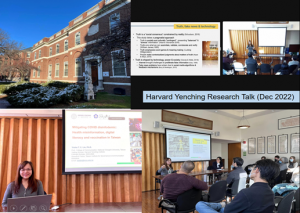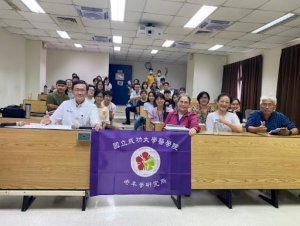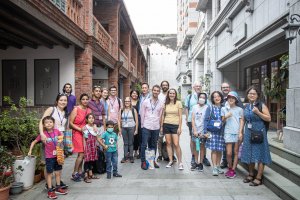I am writing this while on a teaching Fulbright in the Department of Philosophy at National Taiwan University (NTU) in Taipei, during the 2012-2013 school-year. My duties are to teach one graduate class each semester. The first course was American Pragmatism and the second course Comparative Moral Psychology. In this essay, I will discuss how the content in these courses has been modified from similar courses I have taught in the States and what has happened as a result.
There are two basic things that distinguish my Taiwan students from my previous American students. The first is their bilingual abilities. In addition to their native Chinese ability, they can all read English with great facility and have an adequate level of competence in both speaking and listening. The second distinguishing mark is their background in Chinese philosophy. The Department of Philosophy at NTU is divided into two tracks, the Eastern Philosophy track and the Western Philosophy track. Regardless of the track, all undergraduate students are required to take the same basic courses in the history of philosophy, which include thorough introductions to Chinese philosophy. These two characteristics of Taiwan students have allowed me to tailor my courses in unique ways.
My American Pragmatism course covers the major statements of Pragmatism from Charles Sanders Peirce, William James, and John Dewey, among others. Generally when I have taught this course in the past, I have moved from the classic texts in the first 2/3 of the course to more recent Pragmatist pieces in the final 1/3 of the course. Because I’ve never been fully satisfied with the final 1/3 of the course, I decided to do something different this time around.
Since John Dewey spent 2 full years (1919-1921) in China at a crucial period of modern history, and since his major Chinese student, Hu Shih, happened also to be an influential figure in China’s modernization, I used the final 1/3 of the course to explore the works and influence of Dewey and Hu as they relate to Chinese modernization and democratization. In addition to the assigned readings for each day of class, students were required to find a piece by Hu Shih and share it in class.
This exercise proved to be immensely successful because it gave the students an opportunity to bring all of their knowledge of Pragmatism to bear on a subject relevant to their lives, namely, the continuing modernizing and democratizing of their society. Not only were they able to find fascinating pieces by Hu (a figure with whom all were familiar but only in superficial ways), they were also now able to read his statements on Pragmatism and modernization with a new critical eye and to assess his accomplishments as well as the claims of his critics.
The process of tailoring my courses also helped open my eyes in unexpected ways. For example, one of my graduate students is very politically and socially aware and regularly writes op-ed articles for various Taiwan newspapers. When Michael Sandel, a well-known American political philosopher, made a widely publicized visit to the island, this student and I were discussing similarities between Sandel’s positions now and Dewey’s and Hu Shih’s positions nearly a century ago. As we discussed how much progress has been made in Taiwan politically and socially toward democratization and how much progress remains, an op-ed piece started to form. We wrote it together and submitted it to high-profile newspaper. Like most submissions, it was not accepted (alas!), but co-authoring the piece was both educational and inspiring. This op-ed piece, like many conversations I’ve had with my students over weekly lunches, gave me a special insight into the lives and thoughts of the up and coming generation of Taiwanese intellectuals.
Tailoring the courses also opened up new avenues of learning for me as well as for my students. As I mentioned, Hu Shih is a figure known by all educated Taiwanese, but ironically very little is actually known about his thoughts and writings. In other words, here was a major figure in the history of Chinese/Taiwanese modernization whose intellectual legacy was largely unknown by the very people who should be most familiar with it. But he is not the only one. In researching and reading the works of Hu Shih, we came across the work of Yan Yangchu (James “Jimmy” Yen).
Hu Shih initiated an influential movement prior to the May 4th demonstrations of 1919 to transform the common written language from the Classical idiom into a vernacular. In just a few short years it came to fruition when the Chinese Ministry of Education announced that the schools were officially switching all textbooks to the vernacular. The problem now would be getting the largely illiterate population into a position to be able to take advantage of the available resources.
While Hu Shih helped form a group to promote literacy, the hard work fell to James Yen, who headed a now famous project known as the Dingxian (Ting Hsien) experiment. Following a pragmatist spirit of experimentalism, Yen and his team got sponsorship from local officials and heavyweights in the rural village and county of Dingxian and began not only teaching literacy but studying the elements that made for an effective society of learning, from healthcare to employment opportunities. In time, he and his team developed a model for rural reconstruction that could be applied to the rest of the country and even around the world.
Unfortunately, political turmoil curtailed efforts in promoting this work on a large scale in China, but Yen’s work on rural reconstruction resulted in him starting a dedicated college in China, and after leaving China, he put his methods to use in Taiwan and in the Philippines. He went on to help found the International Mass Education Movement and the International Institute of Rural Reconstruction. Pearl Buck produced a book about his experiences and methods. Yen’s bio on the book says:
In May 1943, a distinguished audience of scholars and scientists, representing more than 100 leading universities and research institutes, gathered in New York’s Carnegie Hall on the 400thAnniversary of Copernicus, and as a token of tribute to the memory of Copernicus, Copernicus Citations were bestowed upon ten outstanding “modern revolutionaries.” Among the ten were Albert Einstein, Orville Wright, Henry Ford, John Dewey, and James Yen.”
My students had never heard of him, nor had I.
The second course, entitled Comparative Moral Psychology, is underway right now. This course is based in part on previous courses I have taught, such as Philosophy of Mind, as well as work that I have done on effortless attention. As it stands, this course would be difficult to duplicate in most American philosophy programs due to the reliance on prerequisite knowledge of Chinese philosophy which is less common in American philosophy students.
Each day’s reading is divided into two parts. One part is comprised of selections from a philosophy textbook on moral psychology. The second reading is from an edited volume currently in progress, entitled The Philosophical Challenge from China. Each of these second readings tackles a traditional or current issue in philosophy by way of a resource gleaned from the history of Chinese philosophy. Although the edited volume is intentionally oriented toward readers who have not already had exposure to the history and terminology of Chinese philosophy, in order to do justice to the articles, students should be up to speed on the Chinese background of the articles, which would likely require a significant amount of time in a philosophy course in the States. However, at NTU, I can take that part of the content for granted and focus on the philosophical issues themselves (presented in the first reading per each class), and how they may be approached from a novel Chinese standpoint (broached with the second class reading).
The approach has proved eye-opening for the students. NTU students on the Western track generally see Chinese philosophy as largely irrelevant and appreciate it, if at all, as a charming diversion more than a serious philosophical resource. Those on the Eastern track are accustomed to serious treatments of pre-modern material but not as a resource for engaging focused issues in contemporary philosophy. Both are seeing a new way of approaching their philosophical heritage. It is still too early to say what will come of this course, but at least one Ph.D. student who has been solidly Western in his philosophical orientation to date is writing a term paper that substantially engages pre-modern Chinese material.
As a scholar whose training is in comparative philosophy, I have found it especially interesting working with these students because although they are positioned by their own cross-cultural training to be sensitive to comparative issues, they appear largely oblivious to them–and yet once the issues have been pointed out, they begin to warm to them. For instance, when we were looking at the reason/emotion dichotomy in human psychology and an article in the book purported to demonstrate distinct differences in cognitive styles across genders, and I extended the discussion, citing psychological studies, to differences across cultures, the students began connecting dots in their lives, personally and intellectually, producing examples and speculating about other possible differences.
Overall, as a result of the tailoring of my courses to these particular students, I feel that I have discovered a deeper feeling for the material and new perspectives that will be profitable to all of my students in the future.
Post Views: 4,656







